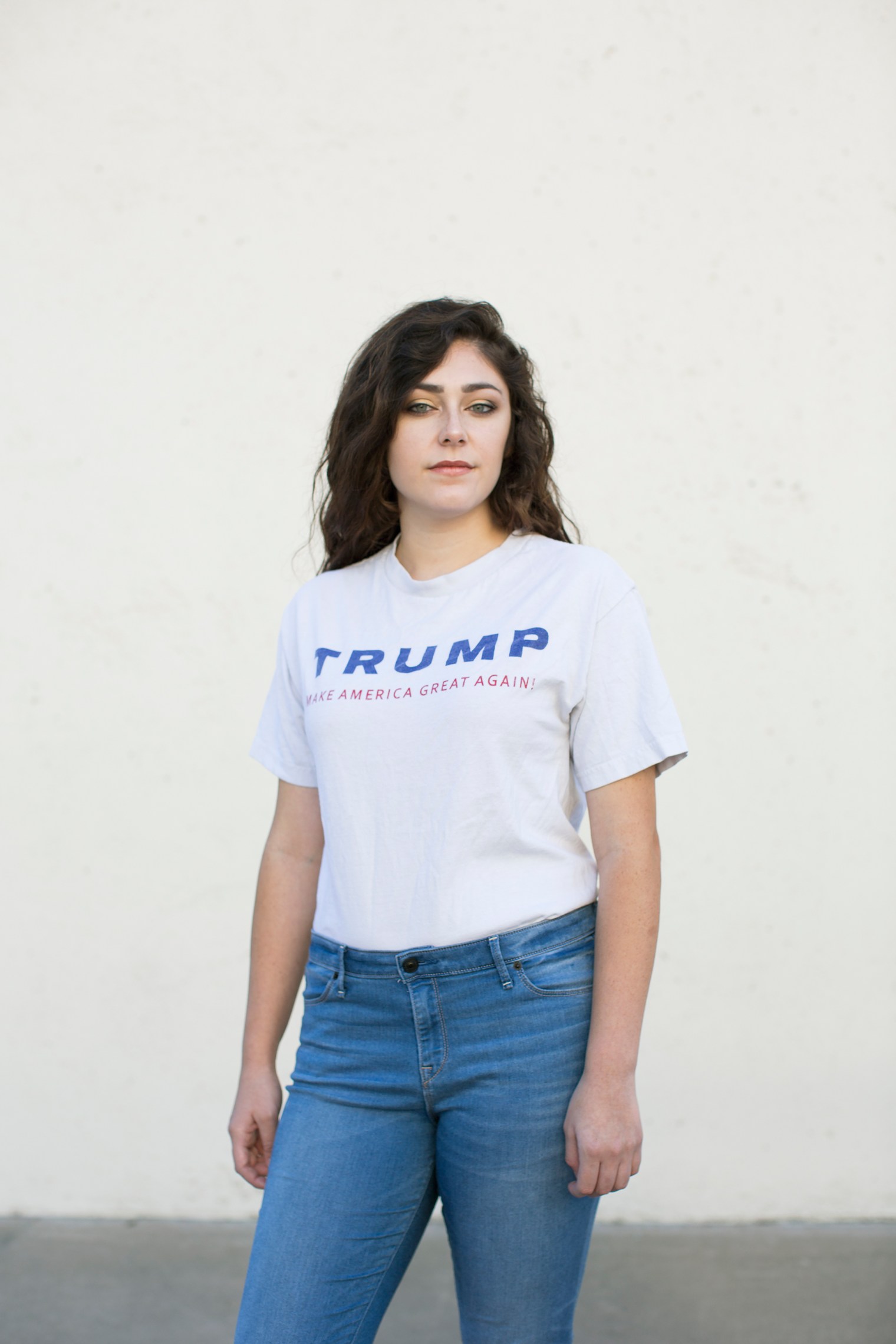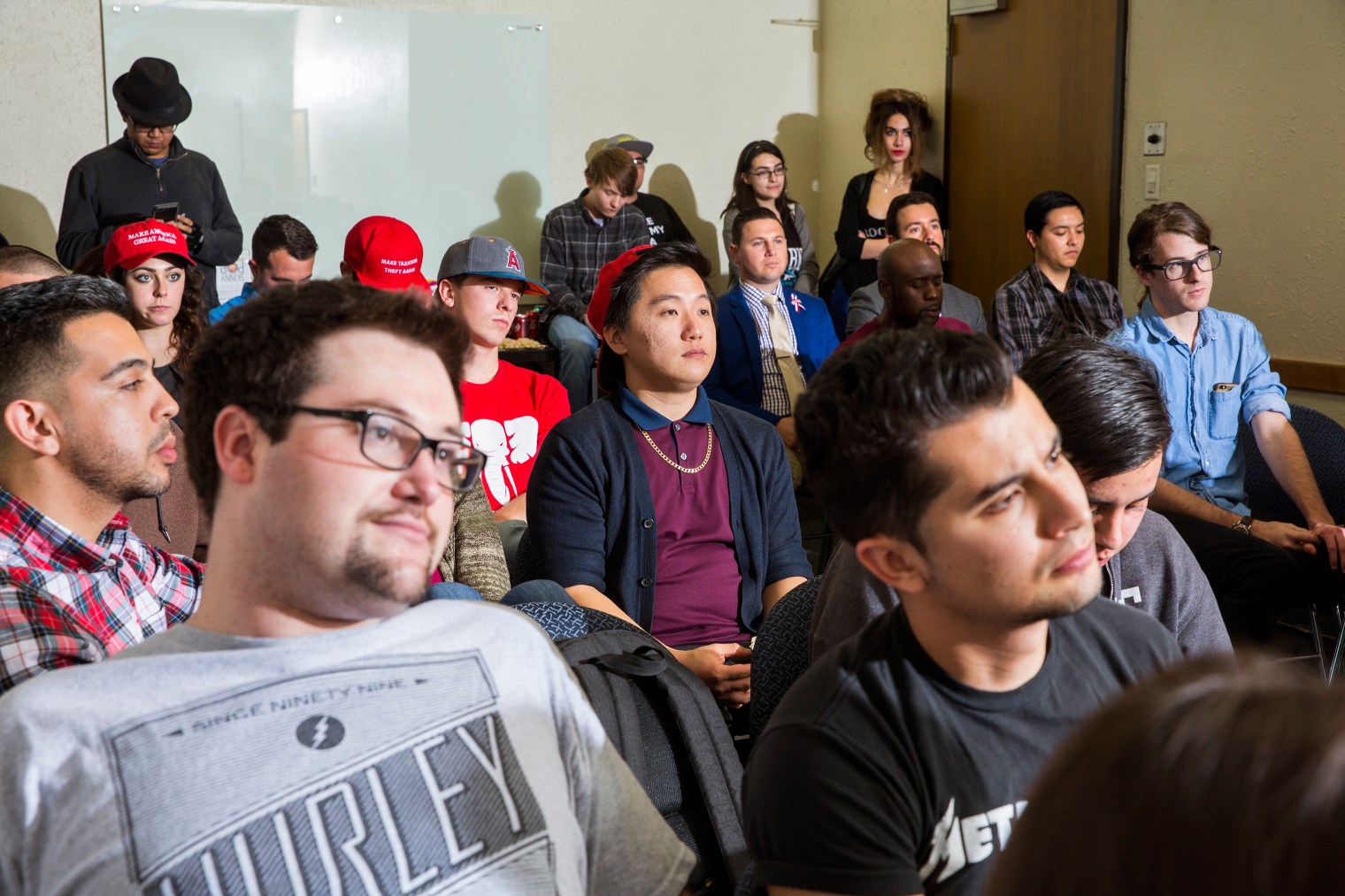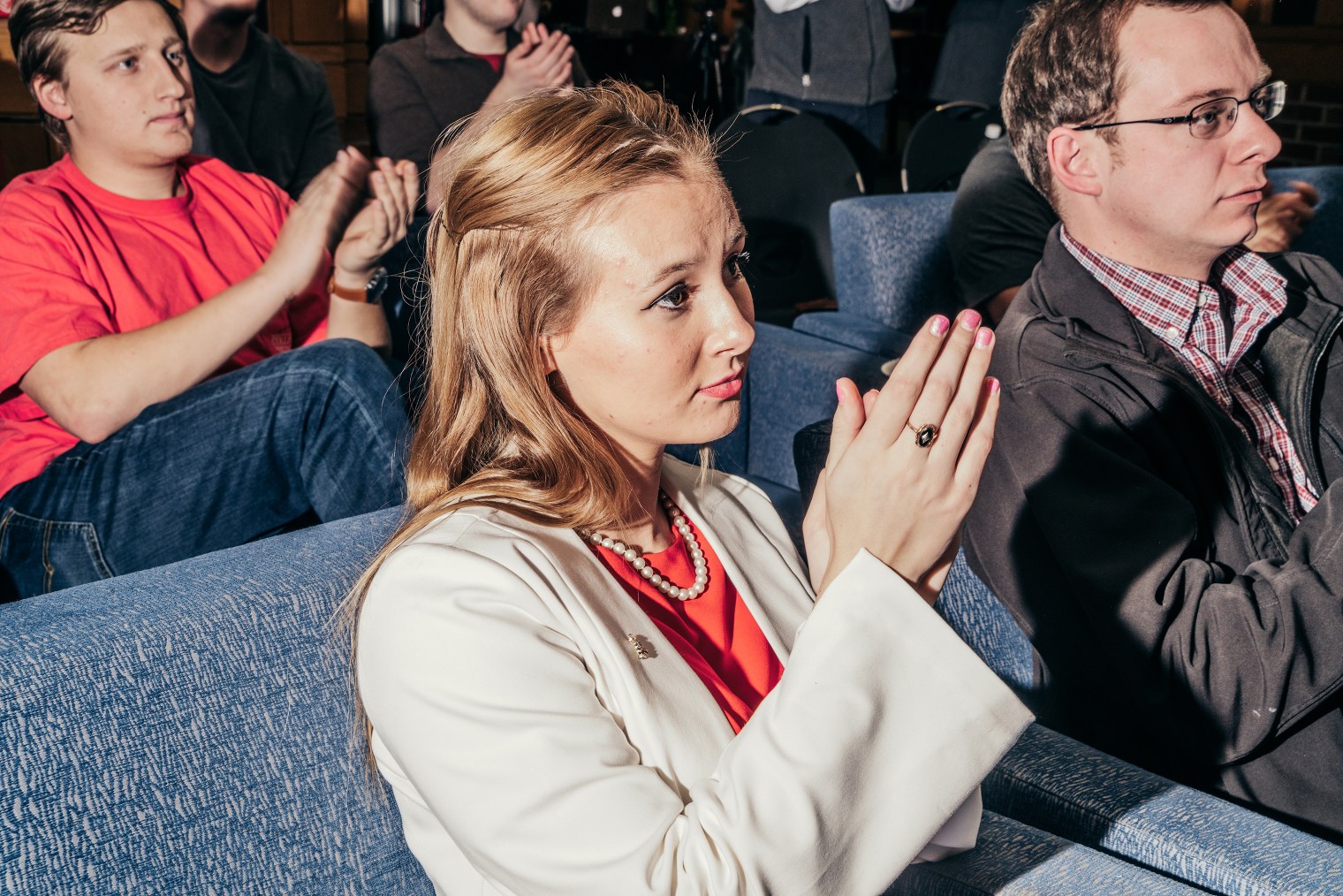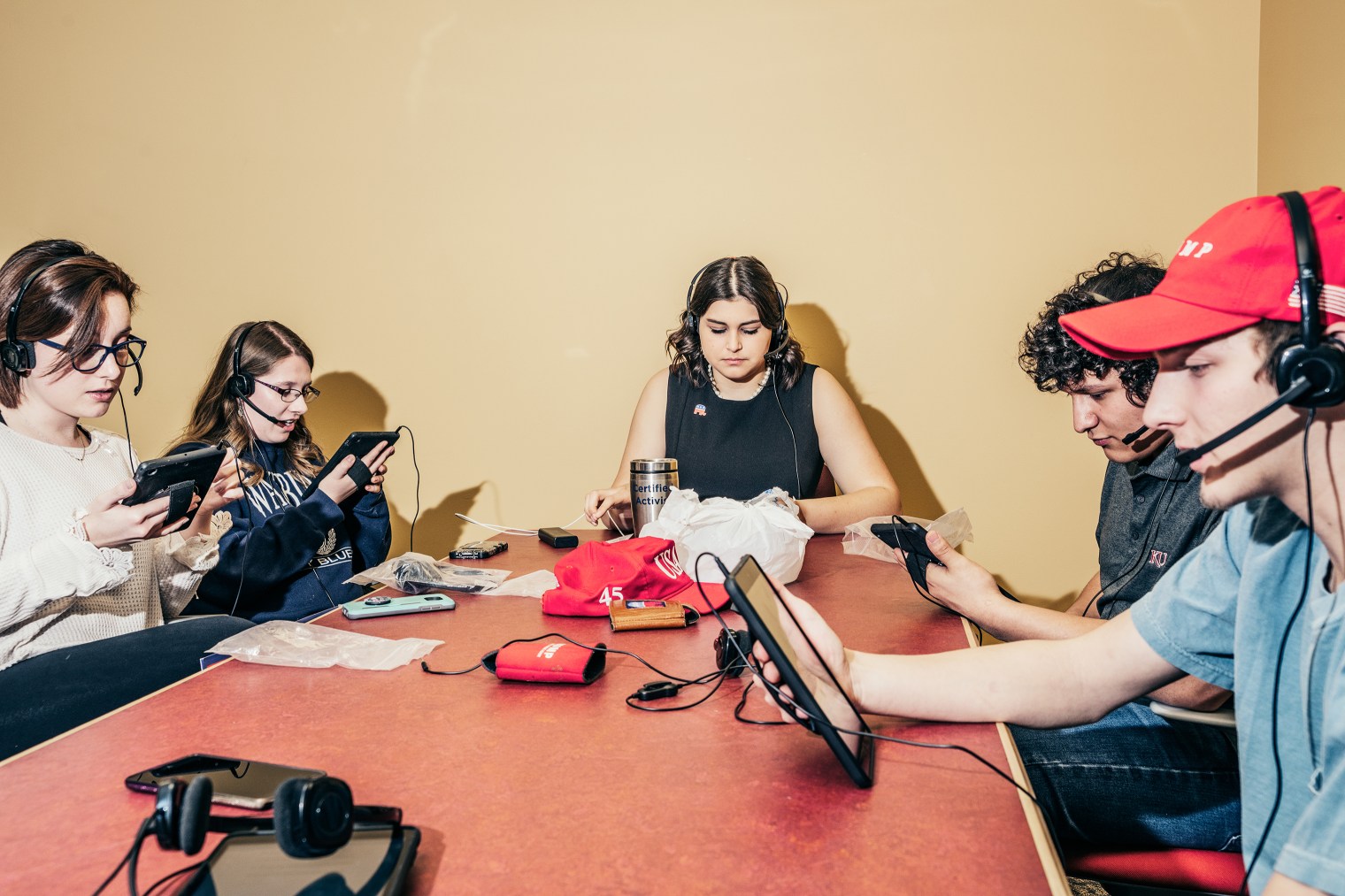‘The Most Hated Person on Campus’: Why Some College Republicans Are Channeling Donald Trump
 Ariana Rowlands, chairwoman of the California College Republicans, poses for a portrait at the University of California, Irvine, Jan. 31, 2018. Angie Smith for TIME
Ariana Rowlands, chairwoman of the California College Republicans, poses for a portrait at the University of California, Irvine, Jan. 31, 2018. Angie Smith for TIME
Ariana Rowlands is like a lot of young conservatives these days. The chairwoman of the California College Republicans enjoys edgy memes, gun-range socials, needling liberals and President Donald Trump. “Trump is this tangible symbol we can look at and think, ‘I can do that too. I can say what I actually believe in,’” says the fiery 21-year-old senior at the University of California, Irvine. “Some people aren’t going to like me for it, but I can say it now. So I think he’s been incredible, especially for the College Republican movement.”
College campuses are like funhouse mirrors, reflecting society’s controversies in skewed proportions. So it’s no surprise that one year into the Trump era, quads across the U.S. are deeply divided about the direction of his presidency. The concerns aren’t just coming from liberals. Some young conservatives worry that Trump is damaging their ability to sell peers on the GOP’s ideas.
While Trump has bent the national party to his will, his approval rating among young Republicans has fallen. According to a recent poll from the Institute of Politics at Harvard’s Kennedy School, just 59% of college students who identify as Republicans approve of Trump’s job performance, down from 70% in early 2017 and far less than the 85% of Republicans who approve of his job performance overall. Researchers from Pew also found that young Republicans were more likely than older counterparts to have switched parties around the time of Trump’s election.
At the same time, Trump has a loyal base of millennial supporters who are digging in, speaking out and even emulating his controversial brand of politics. The 59% who see method in Trump’s divisive style are generally louder than the 41% who are balking. Says Rowlands: “You need to be a little bit provocative … in order to get your message across.”
 Students attend a State of the Union Watch Party organized by the College Republicans at California State University, Fullerton, on Jan. 30, 2018. Angie Smith for TIME
Students attend a State of the Union Watch Party organized by the College Republicans at California State University, Fullerton, on Jan. 30, 2018. Angie Smith for TIME
The one thing everyone on the right seems to agree on is that the GOP needs to draw more young voters into its tent. According to the Harvard poll, 38% of people aged 18 to 29 call themselves Democrats, almost twice the number on the other side. At a moment when millennials are superseding Boomers as America’s biggest voting bloc, that fact has super-charged the rush to shape the hearts and minds of the country’s youth. “What happens when people are in their late teens and early 20s sets them on a political course for the rest of their lives,” says Deborah Schildkraut, a political science professor at Tufts University.
Building on decades of work, a raft of well-funded conservative groups are flooding campuses to pitch students on their priorities, from activist groups like Turning Point USA, which vows to fight liberal bias and out left-wing professors, to the billionaire Koch Brothers, who are spending millions to bolster their free-market ideas in higher education. Left-leaning groups are piling on too. Lately, even white supremacist groups have joined the fray, putting up banners on campuses from Indiana to California in hopes of attracting disaffected white students who, like their non-white peers, feel their identities are under attack these days.
There is a prevailing sense that one must pick a team. “It truly is a battle that we’re fighting on campus,” says Joel Valdez, a campus coordinator for Turning Point USA at the University of Illinois, Urbana-Champaign who has heckled anti-Trump protesters and ruffled peers by putting up signs that say “Socialism Sucks.” Other conservative students eschew such tactics, as well as the President. These tussles may foreshadow the fights to come over the shape of the conservative movement.
Rowlands’ political awakening began when she headed off to college. The daughter of immigrants from Mexico and Wales, she grew up in Orange County, Calif., a historic cradle of conservatism. But the county is evolving politically as its demographics change; it broke for a Democratic presidential candidate in 2016 for the first time since the Great Depression. When she enrolled at Irvine, Rowlands had friends that were “low key liberal.” Then one day in marketing class her freshman year, a peer made a comment about “how black people are systemically oppressed.” Rowlands disagreed, arguing that in America everyone has the same chance to succeed. Two Republicans observed the exchange and invited her to join their club. She says she was president by the next quarter.
Since then, Rowlands has contributed writing to Breitbart News and appeared on Fox News to decry the “war on Christmas.” She also brought former Breitbart firebrand Milo Yiannopoulos to her school, twice, and today describes herself as the most hated person on campus. “I’m definitely not well liked, and I think that’s great,” she says. “I don’t know these people and they hate me because I’m a Republican. And that really shows the hypocrisy of the left.”
 University of Kansas student Abby Hale watches the State of the Union address at the University of Kansas in Lawrence on Jan. 30, 2018. Barrett Emke for TIME
University of Kansas student Abby Hale watches the State of the Union address at the University of Kansas in Lawrence on Jan. 30, 2018. Barrett Emke for TIME
Last year, Rowlands started to cast her sights beyond Orange County. She felt the “establishment” leadership of the College Republicans in the state were complacent and misguided in trying to reach out to left-leaners, so she decided to run for the position of chair. It was the first contested election for the post in nearly a decade, and at times it got ugly: Rowlands accused the other side of trying to suppress her support and says pictures of her were decorated with swastikas and devil horns. As her opponent preached moderation as a way to grow numbers in liberal California, Rowlands told conservative students to stand their ground and stop apologizing when “social justice-y” peers are offended. She also refused to compromise in her full-throated support of Trump. In the end, the insurgent won a solid victory, taking over the job of overseeing all the chapters in the state.
Rowlands is hardly the only young Republican who says Trump is inspiring conservatives to push back against campus cultures of political correctness. For these students, the President’s provocative style of governing – from his Twitter missives to his attacks on institutions like the NFL – is as much a part of the appeal as the progress he’s made on policy. Brooke Paz, a College Republican at California State University, Fullerton, describes being scared to speak up in class for fear of social backlash or bad grades. And she says this feeling of marginalization has led people like her to embrace the President. “Trump is energizing for students right now because today being conservative is rebellious,” says Paz, who is also a Christian and anti-abortion advocate. Republicans may hold the scepters of power in D.C., she says, but “we are the ideological minority on campus. We’re the ones who are persecuted.”
It’s a widespread, decades-old complaint among conservative students who are in the numerical minority on many campuses. While 60% of Democratic students say they feel they can share their opinions on campus “without fear of censorship or negative repercussions,” according to the Harvard poll, only 25% of Republicans say the same. Many get a vicarious thrill from Trump flouting liberal institutions because they feel many professors and administrators are guided by (unacknowledged) liberal thinking, citing examples like a teacher in Orange County who called Trump’s election victory “an act of terrorism.”
Victoria Snitsar, a Trump supporter at the University of Kansas who recently won an election to become chair of the College Republicans in her state, points to a teacher who started wearing a bullet-proof vest to class as a form of protest when concealed carry was permitted for the first time on her campus last year. Chris Vas, president of the College Republicans at nearby Mizzou, says some teachers espouse opinions as fact. “There are courses at the University of Missouri that don’t even border on education,” he says. “It is simply indoctrination.” (While it’s not clear how often leanings manifest as prejudice, one national survey found that 60% of college faculty say they lean left, compared to 13% who lean right.)
Many students say that Trump’s can’t-look-away presidency – and the near-constant opposition from liberal students – has energized conservative clubs on campus. The College Republican National Committee says they don’t actively audit chapters. But there are reports of new ones popping up in the wake of the 2016 election. Rowlands says she is in the midst of activating 11 new or lapsed chapters throughout California. And Turning Point USA leader Charlie Kirk says his organization has seen a “record amount” of new chapters started in the last year, bringing the number up to 450. The Trump presidency has certainly made politics a central part of campus life among a historically apathetic crowd, and that alone is proof enough to some young Republicans that his style of politics makes sense. A little controversy can help broadcast the message.
“Trump isn’t a mainstream politician. He definitely strikes a different chord,” says Isaac Michaud, chair of the Maine Federation of College Republicans. “Seeing him want to shake things up and do things differently to try to help the country definitely opened up our eyes.”
This is not a universal view. Other College Republicans are actively distancing themselves from the President and say they can’t stomach his name-calling. In particular, young conservatives worry about Trump’s rhetoric on gender- and race-related issues. Millennials are the most diverse generation the U.S. has ever seen and Trump has managed to offend minority groups across the spectrum. “We’ve been trying to rebrand,” says Nathan Hogan, co-president of the College Republicans at Brigham Young University in Utah. “Trump really isn’t good for our party and the things he’s doing are only hurting our prospects in the long run.” Despite grumbling from some Trump supporters, Hogan’s group has been hosting friendly bipartisan events, like debate nights with the Democratic club on campus. He is part of a faction that believes reaching across the aisle is a better way to increase the ranks.
Where campus Republicans come down on Trump is partly a reflection of what school they’re attending, says sociologist Amy Binder, author of Becoming Right: How Campuses Shape Young Conservatives. The President is bound to be less popular at elite private schools, where College Republicans are part of smaller, closer-knit communities and have long avoided provocative displays like “Affirmative Action Bake Sales” in favor of high-brow policy talks. The Harvard chapter refused to endorse Trump in the 2016 election. At Yale, the board decided to support his nomination, but several members left in protest, arguing that the mogul was unfit to serve. Since then, says Ben Zollinger, the president of the Yale chapter, none of those members have returned and the group has decided to ignore “somebody who is so divisive on a campus where we struggle to attract members.”
 Victoria Snitsar (center), a Trump supporter who recently won an election to become chair for the College Republicans in her state, holds a phone banking event with fellow University of Kansas College Republicans at the school’s Student Union, Jan. 30, 2018. Barrett Emke for TIME
Victoria Snitsar (center), a Trump supporter who recently won an election to become chair for the College Republicans in her state, holds a phone banking event with fellow University of Kansas College Republicans at the school’s Student Union, Jan. 30, 2018. Barrett Emke for TIME
On a warm January evening, Rowlands was standing at the back of a buzzing lecture hall at California State University, Fullerton, watching fellow College Republicans play bingo. It was one of the club’s first meetings of the semester, and the game was an ice-breaker exercise for the Trump era. The goal was to find members whose personal experiences matched the descriptions in each square. The phrases ranged from “is a minority” and “#MeToo” to “has been accused of having ‘white privilege’” and “is a self-proclaimed deplorable.” It was easy to find someone to check the box that said “Follows Trump on Twitter.”
In addition to Rowlands, the group had another visitor: a representative from the Congressional Leadership Fund, a super PAC connected to House Republican leadership that is dedicated to helping Republicans win seats in the chamber. The emissary, who was greeted with polite attention from the chatty students, was there to tell them about a special offer: knock on 5,000 doors in the midterms and they’ll give the club $1,000. Knock on 10,000 doors and get an additional $1,750.
These are small dollars compared to the cash that other outside conservative groups are pouring into campus projects. Like the students, these organizations use a range of tactics and represent different factions in the conservative movement. Turning Point USA, a nonprofit that keeps quiet about its funders, has raised more than $10 million in the past year to train student activists and host conservative confabs. The group maintains a “Professor Watchlist” of faculty who are allegedly pushing “leftist propaganda” in the classroom.
Kirk, the group’s 24-year-old founder, describes himself as “close” with Trump’s sons, Eric and Donald, Jr., and laments that college students have told him they’ve not heard “one good thing” about Trump or his agenda in the classroom. “There’s a complete silencing of half of the entire country’s view of the world,” he says. “That’s really what bothers us and what we’re trying to change.” His group has also been working to get more right-leaning candidates into student governments and has been accused of improperly funneling money into such elections. (A spokesperson for the organization says that “any accusation we are breaking the law is fallacious and slanderous.”)
At some five years old, Turning Point is a relative newcomer to the campus wars. Young America’s Foundation, founded in 1969, has spent upwards of $18 million on programs in recent years and is currently touting a campus speaking tour by conservative commentator Ben Shaprio, who routinely dismisses liberal college students as “snowflakes” who demand “safe spaces” where they can hide from uncomfortable ideas. Foundations associated with the billionaire Koch brothers, meanwhile, have increased higher-education spending from about $35 million in 2014 to more than $100 million last year, supporting projects at hundreds of universities and colleges across the country. They have funded grants to promote the hot-button issue of free speech and fellowships for PhD candidates in economics. An investigation by the Center for Public Integrity highlighted their work supporting research centers that do academic study bolstering their laissez-faire policy goals.
(Disclosure: Time Inc., TIME’s parent company, has been acquired by Meredith Corp. in a deal partially financed by Koch Equity Development, a subsidiary of Koch Industries Inc.)
Schildkraut, the Tufts professor, says that people are too quick to assume the youth vote is a lost cause for Republicans simply because young people are diverse and skew liberal on issues like LGBT rights. Some traditional conservative positions, like opposing legalized abortion, find significant support among young Americans. And some College Republicans are trying to make room for more progressive thinking on issues like climate change within their party.
Schildkraut also highlights studies suggesting that young white people may react to changing demographics and an accompanying sense of “group threat” by embracing conservative policy positions on issues ranging from immigration to healthcare. The number of young Americans across all ethnic groups who believe their race is under attack “a lot” increased in the last year, up to nearly one-third, according to the Harvard poll. For some, that feeling can add appeal to a party where there is less laser-focus on current and historical inequalities. Many young Republicans accuse liberal peers of being too quick to label Trump supporters as bigots, and cast Democrats as the intolerant side. (A student at the Fullerton meeting, who described himself as a former Democrat, explained his defection in part by pointing to an op-ed about a black mother questioning whether her children could be friends with white people.)
When asked about white-nationalist groups like Identity Evropa that are trying to capitalize on status anxiety among white students, the young Republicans interviewed for this article routinely denounced them. According to the Anti-Defamation League, promotional materials from such groups, like leaflets and posters, have showed up on more than 200 campuses since September 2016. It’s not clear that they’re drawing many new recruits, but it adds to the building feeling of dread. “The alt right just kind of wants to see the world burn,” Rowlands says.
At Fullerton, the College Republicans are excited for the midterms. They’re ready to tout the passage of tax reform, the way Trump is reshaping the judiciary and his hard line on immigration — however distracting his tweeting might be. As conservative students experiment with emulating the President’s style as well as a more restrained brand of conservatism, much of what they learn will depend on how the rest of his presidency shakes out.
Chandler Thornton, the chair of the College Republican National Committee, says his primary aim these days is to “grow the party and help Republicans win young voters.” When asked if Trump is making this harder or easier, he doesn’t answer directly. “He is bringing a lot of excitement,” Thornton says, “which is necessary.” Since 2016, he says he’s traveled to dozens of states to meet with students and found them deeply engaged in the daily churn of America’s political process. “To that end,” he says, “the President is really helping our cause.”
Katy Steinmetz is a senior writer for TIME based in San Francisco.